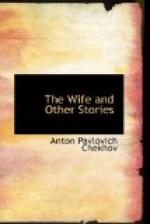My wife’s outburst reminded me of our married life together. In old days after every such outburst we felt irresistibly drawn to each other; we would meet and let off all the dynamite that had accumulated in our souls. And now after Ivan Ivanitch had gone away I had a strong impulse to go to my wife. I wanted to go downstairs and tell her that her behaviour at tea had been an insult to me, that she was cruel, petty, and that her plebeian mind had never risen to a comprehension of what I was saying and of what I was doing. I walked about the rooms a long time thinking of what I would say to her and trying to guess what she would say to me.
That evening, after Ivan Ivanitch went away, I felt in a peculiarly irritating form the uneasiness which had worried me of late. I could not sit down or sit still, but kept walking about in the rooms that were lighted up and keeping near to the one in which Marya Gerasimovna was sitting. I had a feeling very much like that which I had on the North Sea during a storm when every one thought that our ship, which had no freight nor ballast, would overturn. And that evening I understood that my uneasiness was not disappointment, as I had supposed, but a different feeling, though what exactly I could not say, and that irritated me more than ever.
“I will go to her,” I decided. “I can think of a pretext. I shall say that I want to see Ivan Ivanitch; that will be all.”
I went downstairs and walked without haste over the carpeted floor through the vestibule and the hall. Ivan Ivanitch was sitting on the sofa in the drawing-room; he was drinking tea again and muttering something. My wife was standing opposite to him and holding on to the back of a chair. There was a gentle, sweet, and docile expression on her face, such as one sees on the faces of people listening to crazy saints or holy men when a peculiar hidden significance is imagined in their vague words and mutterings. There was something morbid, something of a nun’s exaltation, in my wife’s expression and attitude; and her low-pitched, half-dark rooms with their old-fashioned furniture, with her birds asleep in their cages, and with a smell of geranium, reminded me of the rooms of some abbess or pious old lady.
I went into the drawing-room. My wife showed neither surprise nor confusion, and looked at me calmly and serenely, as though she had known I should come.
“I beg your pardon,” I said softly. “I am so glad you have not gone yet, Ivan Ivanitch. I forgot to ask you, do you know the Christian name of the president of our Zemstvo?”
“Andrey Stanislavovitch. Yes....”
“Merci,” I said, took out my notebook, and wrote it down.
There followed a silence during which my wife and Ivan Ivanitch were probably waiting for me to go; my wife did not believe that I wanted to know the president’s name—I saw that from her eyes.
“Well, I must be going, my beauty,” muttered Ivan Ivanitch, after I had walked once or twice across the drawing-room and sat down by the fireplace.




